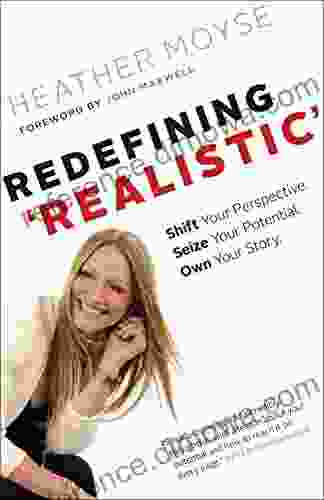Embodied Acting: Unlocking the Secrets of Performance with Neuroscience

In the world of acting, the body is the instrument through which performers convey stories, emotions, and ideas. But how does the body actually contribute to the art of acting? What role does it play in creating believable characters and captivating performances?
In her groundbreaking book, "Embodied Acting: What Neuroscience Tells Us About Performance," Dr. Rebecca Schneider explores the fascinating relationship between the body and acting. Drawing on the latest research in neuroscience, psychology, and somatics, she uncovers the science behind what makes an actor's performance truly memorable.
The Embodied Mind
4.6 out of 5
| Language | : | English |
| File size | : | 2027 KB |
| Text-to-Speech | : | Enabled |
| Screen Reader | : | Supported |
| Enhanced typesetting | : | Enabled |
| Word Wise | : | Enabled |
| Print length | : | 257 pages |
At the heart of embodied acting lies the concept of the embodied mind. This theory, based on research in cognitive science, suggests that the mind and body are inextricably linked. Our physical experiences, sensations, and emotions shape our thoughts and perceptions, and vice versa.
For actors, this has profound implications. Their bodies become not just tools for movement and expression, but also conduits for emotional connection and storytelling. By engaging their bodies fully in the performance, actors can access a deeper level of authenticity and resonance with their audiences.
Neuroscience and the Actor's Brain
Dr. Schneider's research delves into the intricate workings of the actor's brain. She examines how the brain responds to emotional stimuli, how it processes empathy, and how it controls movement and coordination.
This understanding of the neural underpinnings of acting provides valuable insights into the cognitive and physiological processes that contribute to a successful performance. For instance, studies have shown that actors who embody their characters more fully exhibit increased activation in areas of the brain associated with emotion and empathy.
The Sensory Actor
One of the key principles of embodied acting is the importance of sensory awareness. Actors must be attuned to their own physical sensations, as well as those of their surroundings. This heightened sensory awareness allows them to respond spontaneously and authentically to the stimuli around them.
By cultivating their sensory abilities, actors can create more nuanced and believable performances. They can better convey the emotions and intentions of their characters, and they can connect more deeply with their audiences on an emotional level.
The Actor's Physicality
Of course, the body itself is a crucial aspect of embodied acting. Dr. Schneider emphasizes the importance of developing physical skills, such as coordination, flexibility, and expressiveness. These skills enable actors to embody their characters physically, to move with authenticity and grace, and to project their emotions through their bodies.
By engaging in physical training and exercises, actors can enhance their physicality and become more proficient in conveying meaning through their bodies. They can explore different ways of moving, experimenting with weight, rhythm, and spatial relationships to create unique and captivating performances.
The Emotional Connection
Ultimately, embodied acting is about creating an emotional connection with the audience. By using their bodies, voices, and minds in an integrated way, actors can evoke powerful emotions in their viewers.
The embodied approach to acting emphasizes the importance of authenticity and vulnerability. Actors must be willing to expose their own emotions and experiences in Free Download to create truly resonant performances. By ng so, they can forge a deep bond with their audiences, leaving a lasting impact on their hearts and minds.
Embodied acting is a transformative approach that empowers actors to unlock their full potential as performers. Drawing on the latest insights from neuroscience, psychology, and somatics, Dr. Rebecca Schneider's groundbreaking book provides a roadmap for creating authentic, emotionally resonant, and physically engaging performances.
Whether you are an aspiring actor, a seasoned professional, or simply someone interested in the art of performance, "Embodied Acting: What Neuroscience Tells Us About Performance" is an invaluable resource. It offers practical techniques, scientific insights, and inspiring stories that will revolutionize the way you approach acting and elevate your performances to new heights.
4.6 out of 5
| Language | : | English |
| File size | : | 2027 KB |
| Text-to-Speech | : | Enabled |
| Screen Reader | : | Supported |
| Enhanced typesetting | : | Enabled |
| Word Wise | : | Enabled |
| Print length | : | 257 pages |
Do you want to contribute by writing guest posts on this blog?
Please contact us and send us a resume of previous articles that you have written.
 Book
Book Novel
Novel Page
Page Chapter
Chapter Text
Text Story
Story Genre
Genre Reader
Reader Library
Library Paperback
Paperback E-book
E-book Magazine
Magazine Newspaper
Newspaper Paragraph
Paragraph Sentence
Sentence Bookmark
Bookmark Shelf
Shelf Glossary
Glossary Bibliography
Bibliography Foreword
Foreword Preface
Preface Synopsis
Synopsis Annotation
Annotation Footnote
Footnote Manuscript
Manuscript Scroll
Scroll Codex
Codex Tome
Tome Bestseller
Bestseller Classics
Classics Library card
Library card Narrative
Narrative Biography
Biography Autobiography
Autobiography Memoir
Memoir Reference
Reference Encyclopedia
EncyclopediaA Z R
 Julie Eshbaugh
Julie Eshbaugh D Ann Burrow
D Ann Burrow Ana Andjelic
Ana Andjelic Kathryn Mederos Syssoyeva
Kathryn Mederos Syssoyeva Michael A Messner
Michael A Messner Sarah Govett
Sarah Govett Mary Hoffman
Mary Hoffman Michelle Ray
Michelle Ray Abhishek Mishra
Abhishek Mishra Sara Taylor
Sara Taylor Jacques I Pankove
Jacques I Pankove Susie Shellenberger
Susie Shellenberger Amy Huntington
Amy Huntington Adam Gallardo
Adam Gallardo Glenn Haggerty
Glenn Haggerty Abby Mcdonald
Abby Mcdonald Adam Goldstein
Adam Goldstein Abhay Adil
Abhay Adil Brian Moses
Brian Moses
Light bulbAdvertise smarter! Our strategic ad space ensures maximum exposure. Reserve your spot today!
 Alex ReedFollow ·7.2k
Alex ReedFollow ·7.2k Terry PratchettFollow ·9k
Terry PratchettFollow ·9k Ike BellFollow ·6.8k
Ike BellFollow ·6.8k Deion SimmonsFollow ·17.6k
Deion SimmonsFollow ·17.6k Keith CoxFollow ·19.8k
Keith CoxFollow ·19.8k Nathan ReedFollow ·5.3k
Nathan ReedFollow ·5.3k J.D. SalingerFollow ·3.4k
J.D. SalingerFollow ·3.4k Darrell PowellFollow ·2.9k
Darrell PowellFollow ·2.9k

 Julio Cortázar
Julio CortázarShift Your Perspective, Seize Your Potential, Own Your...
A Transformative Guide to...

 Isaias Blair
Isaias BlairPractical Algorithms For 3d Computer Graphics: Unlocking...
In the realm of digital artistry, 3D computer...

 Joseph Heller
Joseph HellerClear Vision Through Cloudy Eyes: A Guide to Overcoming...
Have you ever felt...

 Leo Tolstoy
Leo TolstoyThe True Story of My Fairygodparent Who Almost Killed Me...
Book Description In this captivating...

 Earl Williams
Earl WilliamsCanada 10 Must Visit Locations: A Captivating Journey...
Prologue: A...
4.6 out of 5
| Language | : | English |
| File size | : | 2027 KB |
| Text-to-Speech | : | Enabled |
| Screen Reader | : | Supported |
| Enhanced typesetting | : | Enabled |
| Word Wise | : | Enabled |
| Print length | : | 257 pages |














